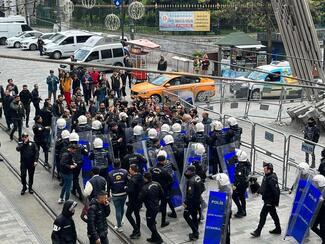
Turkey’s Constitutional Court declared that international travel ban imposed on human rights activist Nurcan Kaya violated her freedom of expression, the Media and Law Studies Association (MLSA) announced on March 6.
According to Veysel Ok, co-director of the MLSA, this ruling sets a precedent for judges to consider when imposing judicial control measures, such as travel bans.
"This is the first decision directly linking the ban on leaving the country to a violation of freedom of expression. Therefore, it is a precedent," Ok said, noting the ruling’s impact on journalists, who are deprived of their rights to travel and report due to these bans.
He added that Turkish courts have increasingly imposed arbitrary judicial controls on journalists, lawyers, and politicians.
For instance, Peoples' Equality and Democracy (DEM) Party Deputy Parliamentary Speaker Sırrı Sürreya Önder recently remarked that he and 15 fellow DEM lawmakers were barred from leaving Turkey despite having legislative immunity following a proposal to visit Palestine after Israeli attacks on Gaza.
The case of Nurcan Kaya revolves around her detention at Istanbul airport in October 2019 while attempting to attend a United Nations meeting abroad.
She was detained as part of an investigation accusing Kaya of "inciting hatred and enmity among the people," following a tweet in 2014 in which she wrote that "Not just the Kurds, but all peoples living in Kobane are resisting."
During her trial, Kaya endured a 1.5-month-long period of judicial control, which included an international travel ban and a confiscation of her passport.
The Constitutional Court has now deemed this measure to violate her freedom of expression.
The court recognized that the judicial controls imposed on Kaya due to her social media activity impeded her ability to participate in public discourse and awarded Kaya 13,500 liras in non-pecuniary damages.
Furthermore, the Constitutional Court criticized the judiciary for not considering less restrictive measures before imposing the travel ban and for rejecting appeals against the ban based on "abstract reasons."



